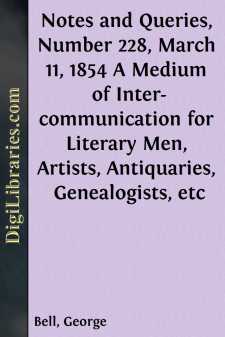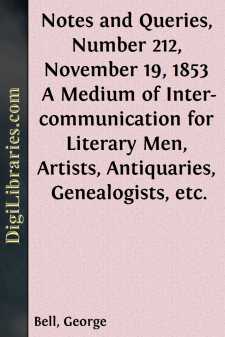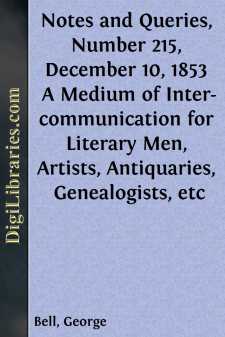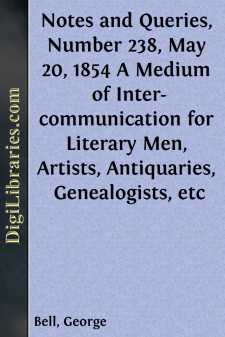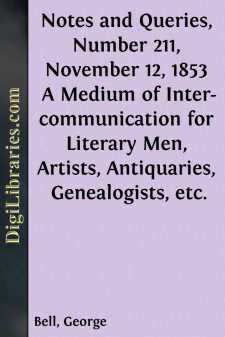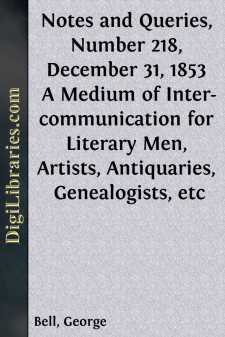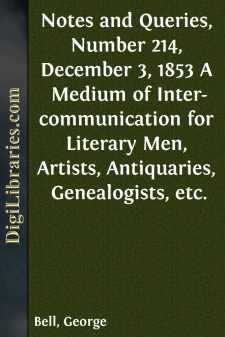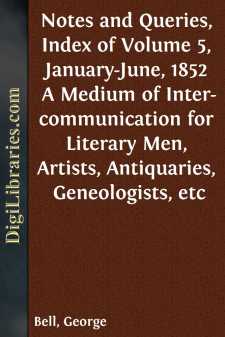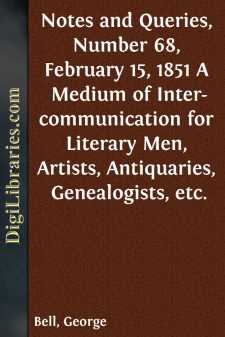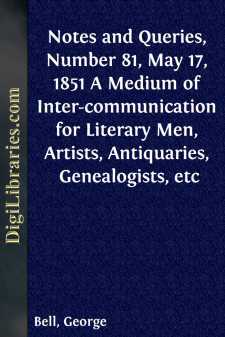Categories
- Antiques & Collectibles 13
- Architecture 36
- Art 48
- Bibles 22
- Biography & Autobiography 813
- Body, Mind & Spirit 142
- Business & Economics 28
- Children's Books 17
- Children's Fiction 14
- Computers 4
- Cooking 94
- Crafts & Hobbies 4
- Drama 346
- Education 46
- Family & Relationships 57
- Fiction 11829
- Games 19
- Gardening 17
- Health & Fitness 34
- History 1377
- House & Home 1
- Humor 147
- Juvenile Fiction 1873
- Juvenile Nonfiction 202
- Language Arts & Disciplines 88
- Law 16
- Literary Collections 686
- Literary Criticism 179
- Mathematics 13
- Medical 41
- Music 40
- Nature 179
- Non-Classifiable 1768
- Performing Arts 7
- Periodicals 1453
- Philosophy 64
- Photography 2
- Poetry 896
- Political Science 203
- Psychology 42
- Reference 154
- Religion 513
- Science 126
- Self-Help 84
- Social Science 81
- Sports & Recreation 34
- Study Aids 3
- Technology & Engineering 59
- Transportation 23
- Travel 463
- True Crime 29
George Bell
The author has not yet completed their profile.
Author's Books:
Sort by:
by:
George Bell
WHERE ARE THE WILLS TO BE DEPOSITED? The difficulties thrown in the way of all literary and historical inquiries, by the peculiar constitution of the Prerogative Office, Doctors' Commons, have long been a subject of just complaint. An attempt was made by The Camden Society, in 1848, to procure their removal, by a Memorial addressed to the Archbishop of Canterbury, which we now print, because it...
more...
by:
George Bell
PARTY-SIMILES OF THE SEVENTEENTH CENTURY—NO. I. "FOXES AND FIREBRANDS." NO. II. "THE TROJAN HORSE." With Englishmen, at least, the seventeenth was a century pre-eminent for quaint conceits and fantastic similes: the literature of that period, whether devotional, poetical, or polemical, was alike infected with the universal mania for strained metaphors, and men vied with each other in...
more...
by:
George Bell
In my first communication I did myself the pleasure to send you a correct list of all the royal letters which had been sent by different English monarchs to the Grand Masters of Malta, with their dates, the languages in which they were written, and stating to whom they were addressed. I now purpose to forward with your permission from time to time, literal translations of these letters, which Mr....
more...
by:
George Bell
A LEADER FROM A FOREIGN NEWSPAPER: THE NEW RUSSIAN MANIFESTO. Mention was recently made, in Vol. ix., p. 218., of the valuable character of many of the leading articles in the continental journals, and a wish expressed that translations of them were more frequently communicated in our own papers to English readers. The great newspapers of this country are too rich in varied talent and worldwide...
more...
by:
George Bell
NOTES ON GRAMMONT. Agreeing with Mr. Peter Cunningham (vide History of Nell Gwyn), that a new edition of Grammont is much wanted, I beg to avail myself of your pages, and to offer a few remarks and notes which I have made in reference to that very entertaining work for the consideration of a future annotator. Of the several maids of honour mentioned therein I will begin with those of the queen. They...
more...
by:
George Bell
Minor Notes. Italian-English (Vol. viii., p. 436.).—The following wholesale assassination of the English language was perpetrated in the form of a circular, and distributed among the British residents at Naples in 1832: "Joseph the Cook, he offer to one illuminated public and most particular for British knowing men in general one remarkable, pretty, famous, and splendid collection of old goods,...
more...
by:
George Bell
PETER BRETT. Your correspondent T. K. seems to think that Scotchmen, and Scotch subjects, have an undue prominence in "N. & Q.:" let me therefore introduce to your readers a neglected Irishman, in the person of Peter Brett, the "parish clerk and schoolmaster of Castle-Knock." This worthy seems to have been a great author, and the literary oracle of the district over which he...
more...
by:
George Bell
No description available
by:
George Bell
DEFENCE OF THE EXECUTION OF MARY QUEEN OF SCOTS. Allow me to supply a deficiency in my last volume of Extracts from the Registers of the Stationers' Company, printed by the Shakspeare Society. It occurs at p. 224., in reference to an entry of 11th Feb., 1587, in the following terms: "John Wyndett. Lycensed alsoe to him, under the B. of London hand and Mr. Denham, An Analogie or Resemblance...
more...
by:
George Bell
Notes. ILLUSTRATIONS OF CHAUCER, NO. VI. Unless Chaucer had intended to mark with particular exactness the day of the journey to Canterbury, he would not have taken such unusual precautions to protect his text from ignorant or careless transcribers. We find him not only recording the altitudes of the sun, at different hours, in words; but also corroborating those words by associating them with physical...
more...


